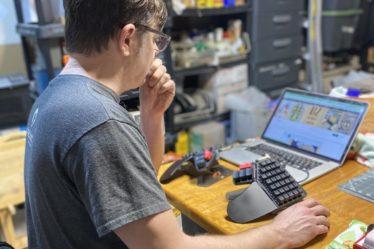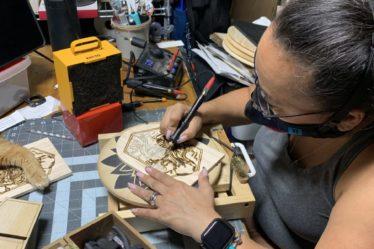
I came up with the idea to create this series when I was looking back on the past two and a half years as a small business owner, thinking “What are the things that I wish someone had told me about starting a business.” Creating is a full-time job in and of itself and running a business is like adding another full-time job on top of it. Hopefully, this series will help guide you through some of the preliminary steps. Full transparency: if I recommend any products I will include affiliate links so, if you decide to buy any of them, I will get a small kickback. Don’t fret, though, that has not swayed my opinion and every one of the products I recommend is something I fully endorse because I use it myself.
Anyone who has started a small business can tell you it is a daunting task. In addition to bankrolling the entire business, there are countless decisions to make every day, from what font I use on my business card to how much product I need to make for my next market. Regardless, the excitement of being your own boss is exhilarating. It gives you the ability to make your own hours, the freedom to make things that represent you as an artist, and the autonomy to decide who you work with. As with anything, though, there are two sides to the coin. Sure, you can take a vacation whenever you want but, if you aren’t making products, you aren’t getting paid. You may have carte blanche to make whatever your heart desires, but is it going to resonate with customers and are they going to put down their hard-earned money for it.
As we go through this series we are going to look at some of the big questions: What should I make? How am I going to sell it? How do I finance this whole endeavor? We looked at many avenues for the “where” such as Craft and Art Shows, Flea Markets, Farmer’s Markets, Events, Festivals, and Trade Shows. Craft shows seemed to cater to creatives and small businesses so that is what we selected and that is what we are going to focus on in this series
Legalities – The Fine Print
What better place to start a series like this than the one thing that scares people the most when starting a business. The legal aspect. We are not lawyers so remember to check with your legal advisor on the rules specific to your business as well as your state / country. These are the steps we took for our business:
- Create a legal business entity. After selecting a name we contacted an attorney to establish our company. We chose Legal Zoom as they have a good reputation and work with a lot of small businesses. We decided to establish our businesses as a Limited Liability Company (LLC) to protect our personal assets in the event of a lawsuit or debt. Legal Zoom walked us through all the required state and federal paperwork and, after paying their fee, we received our paperwork once it was approved. This included a Company Operating Agreement, a Financial Account Authorization Letter, a copy of our IRS Tax ID Application Form to apply for a Tax ID number, IRS Tax ID Number, and LLC Articles of Organization.
- Pay your Taxes. You are required by law to collect taxes on all products that you sell. You need to register with the State Department of Revenue for your state. Once you do you will receive a certificate of Registration in the mail. After that, you need to make sure that you follow your state guidelines for collecting taxes on every sale and reporting those taxes on a monthly, quarterly, or annual basis (whatever your state requires) and paying the amount owed.
- Create your Bank Account: It is generally a good idea to keep your business and your personal expenses separate. The best way to do this is to open up a specific bank account for the business. All incoming or outgoing money for the business should go through this account. This allows you to track your spending, profits, and current balance. You will need the Financial Account Authorization Letter to open up the business account.
There are other things to think about as well such as “do you want to get business insurance for your small business”. These are all things that you will have to consider over the lifetime of your business but, in my experience, the points above are the bare minimum that you need to establish and protect your business. If you want to learning more about pop-up markets you can continue on to part two of our series. Until then, stay unique.



